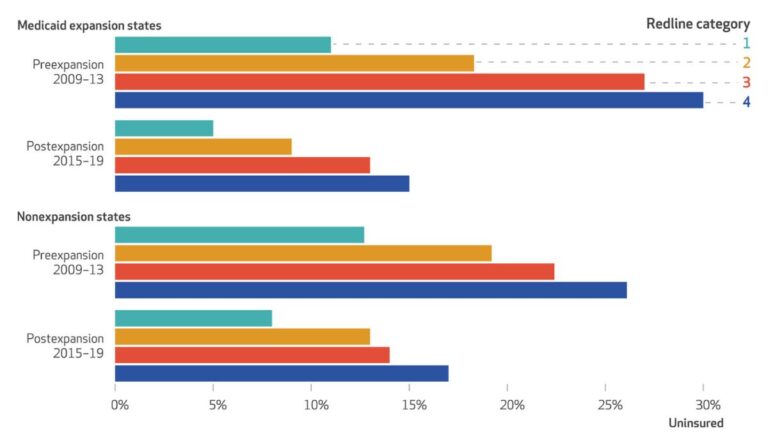Expanding Equity
Medicaid expansion had the largest impact on lowering uninsurance rates in states with the greatest amount of historical redlining practices.

Read Time: 2 minutes
Published:
States that expanded Medicaid under the Affordable Care Act nearly a decade ago have better health and financial outcomes among lower-income families. The benefits of Medicaid expansion extend into neighborhoods that are still affected by redlining – a historically racist practice that excluded certain neighborhoods from financial services.
Still, the legacy of redlining today includes limited resources, fewer job opportunities, and lower-quality education that feed into ongoing inequity in housing, wealth, and community development.
Jason Semprini and his team at the University of Iowa studied how past redlining practices affect health coverage differences among racial and ethnic groups based on where people live today.
Researchers extracted data from Mapping Inequality, a historical redline data project, and the American Community Survey to collect national uninsurance rates. They compared Medicaid coverage in these areas with a history of redlining for adults aged 18-64 in states with and without Medicaid expansion.
The graph above shows categories of redlining, stratified from least (1) to most (4) severe. Medicaid expansion had the largest impact on lowering uninsurance rates in states with the greatest amount of redlining (Category 4).
For states that have expanded Medicaid, the lowered insurance rates have been helpful to those still burdened by the racial and ethnic disparities in places that once experienced the most severe redlining. States that have not expanded Medicaid have prevented millions of low-income adults from accessing health insurance, and structural racism continues to affect lives.
Databyte via Jason Semprini, Abdinasir K. Ali, and Gabriel A. Benavidez. Medicaid Expansion Lowered Uninsurance Rates Among Nonelderly Adults In The Most Heavily Redlined Areas. Health Affairs, 2023.



